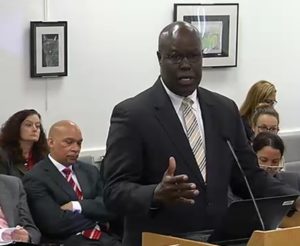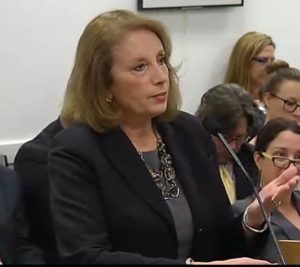A school district in rural North Florida is in dire straits, prompting state education officials to grapple with unprecedented questions. What happens when a school district can no longer operate its own schools?
That possibility came into view Tuesday, when the state Board of Education, for the third time, rejected a plan by the Jefferson County school district to turn around a persistently struggling school.
Jefferson County Elementary School is currently rated a D under the state grading system, and hasn't earned a C since 2009. Citing that grim track record, lingering staff vacancies and an ongoing financial emergency, Education Commissioner Pam Stewart said, "I am truly of the opinion that the district lacks the ability" to turn around the situation on its own.

Florida K-12 Schools Chancellor Hershel Lyons explains Jefferson County's struggles to the state Board of Education.
She asked the district to choose a new plan from among three options: Recruit a charter school operator to take over the elementary school, bring in an outside company to operate it, or close the school and send students elsewhere.
"I think when we do one of those three things, our students in Jefferson County will be the beneficiaries, and that is the ultimate goal, and what we are charged with doing," Stewart said.
The district only has one elementary school, so any of those options would take it out of the business of running elementary schools altogether.
The future of Jefferson's combined middle-high school is also in question. The state board previously approved its turnaround plan, but Stewart said she had doubts the district was following through, and that it hadn't hired a principal with bona fide turnaround experience. As a result, she said, the board might consider similar options for Jefferson's secondary students at a future meeting.
Jefferson County is an outlier in many ways. It has the lowest student achievement in the state. Hershel Lyons, the state's chancellor for K-12 schools, said more than half of its high school students had been forced to repeat more than two grades. Jefferson has one of the state's highest poverty rates. Its student population has shrunk by an unparalleled 30 percent in five years. It is now Florida's smallest school district. It has the highest rate of private school enrollment in the state, and other parents have moved their kids to neighboring districts.
Despite having the state's second-highest rate of per-pupil spending, it's pulling itself back from the brink of financial crisis. Its finances are under the supervision of a volunteer emergency board.
Marianne Arbulu, the district's new superintendent, told the state board her staff worked around the clock and through the holidays to address the myriad issues facing the district. She said she agrees there need to be drastic changes. Before the board rejected the district's latest turnaround plan, she said: "I'm very happy to go back and put everything back on the table."
"We need to change what's going on in our district," she said. "We're out of time. We're done. We cannot continue like this any longer, from any perspective."

Jefferson County's newest school superintendent, Marianne Arbulu, told the state Board of Education she wants to turn things around.
Arbulu took office after November elections in which frustrated voters ousted the incumbent after a single term, just like they had four years earlier.
She was addressing a state the board that has recently gotten more active in critiquing and demanding changes to district's plans to turn around schools that repeatedly earn D's and F's in the state's grading system. Accountability laws give districts five options: They can manage a turnaround themselves, turn the struggling schools over to a charter operator, hire a private turnaround company, close a school entirely, or formulate a different strategy with a "demonstrated record of effectiveness."
In the vast majority of cases, districts propose the first option, and the state board approves their plans. Closures and charter conversions almost never happen.
Of Florida's 653 extant charter schools, 22 were converted from traditional schools. Only one of those conversion charters, a Charlotte County center for foster children, opened in the past decade.
Some state board members said it might be hard to pull off a charter conversion in time for next school year. It's a "tight turnaround," Rebecca Fishman Lipsey observed.
"I don't know how difficult it is at this point in time to find a charter operator that's willing to do a conversion charter," added Gary Chartrand, another board member and charter school backer. "This is not a startup."
Despite its small size, now less than 730 students, Jefferson County did have a charter school once. Care Charter School of Excellence shut down after two years, buffeted by the same woes that plagued the district as a whole: Low enrollment, high poverty, a school grade of F. The right operator might have some advantages in Jefferson, however. It would get a facility, and it would have an opportunity to attract students who have fled either to neighboring districts or private schools.
The right operator might have some advantages in Jefferson, however. It would get a facility, and it would have an opportunity to attract hundreds of students who have fled either to private schools or neighboring districts.
The district will have a say in whatever plan ultimately takes shape. Florida's constitution gives local school boards authority over all public schools in their geographic areas, though that doesn't preclude public schools, including charters, that the district doesn't technically manage itself. And the constitution also gives the state board authority to make sure districts follow through with their responsibilities.
Some board members, like Michael Olenick, said they wished the state had more authority to force the district to make changes. The situation in Jefferson "has failed an entire generation of kids," he said, and the Legislature might need to get involved.
"This is about our constitutional obligation to ensure that these kids are getting a high-quality education, and they are not," he said.
For more reporting on the situation from local outlets, see WFSU News and the Tallahassee Democrat.